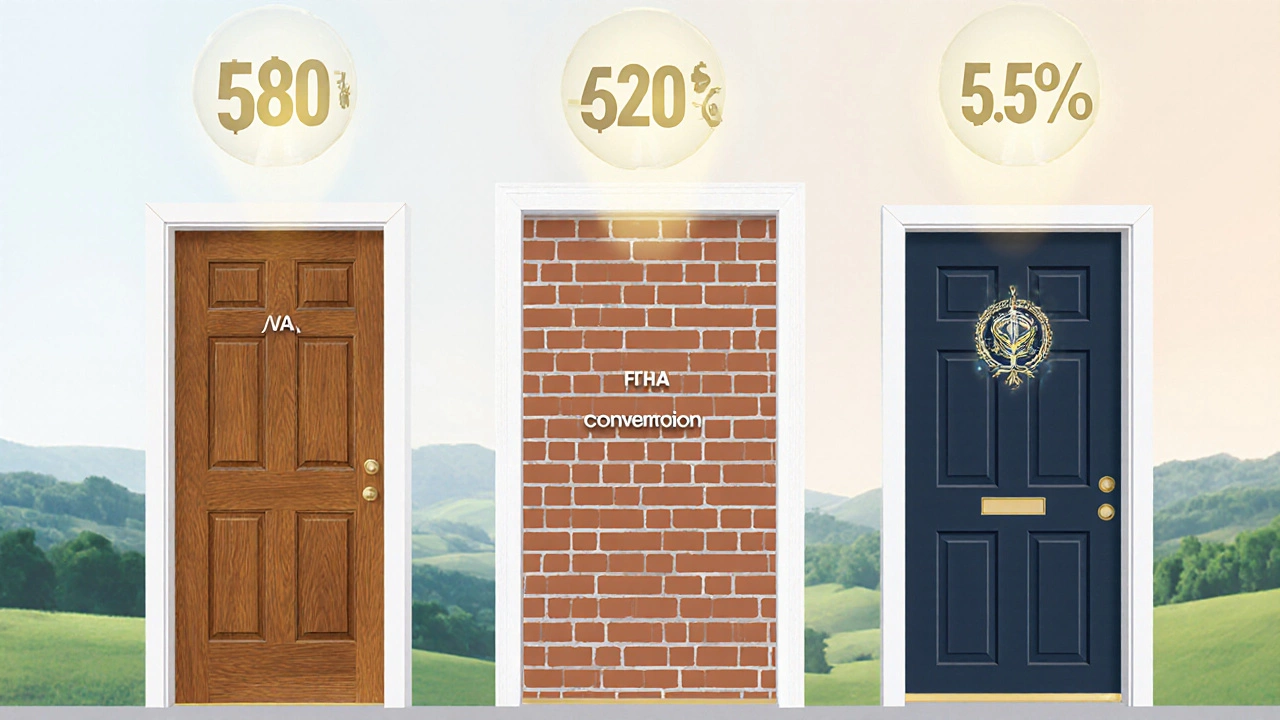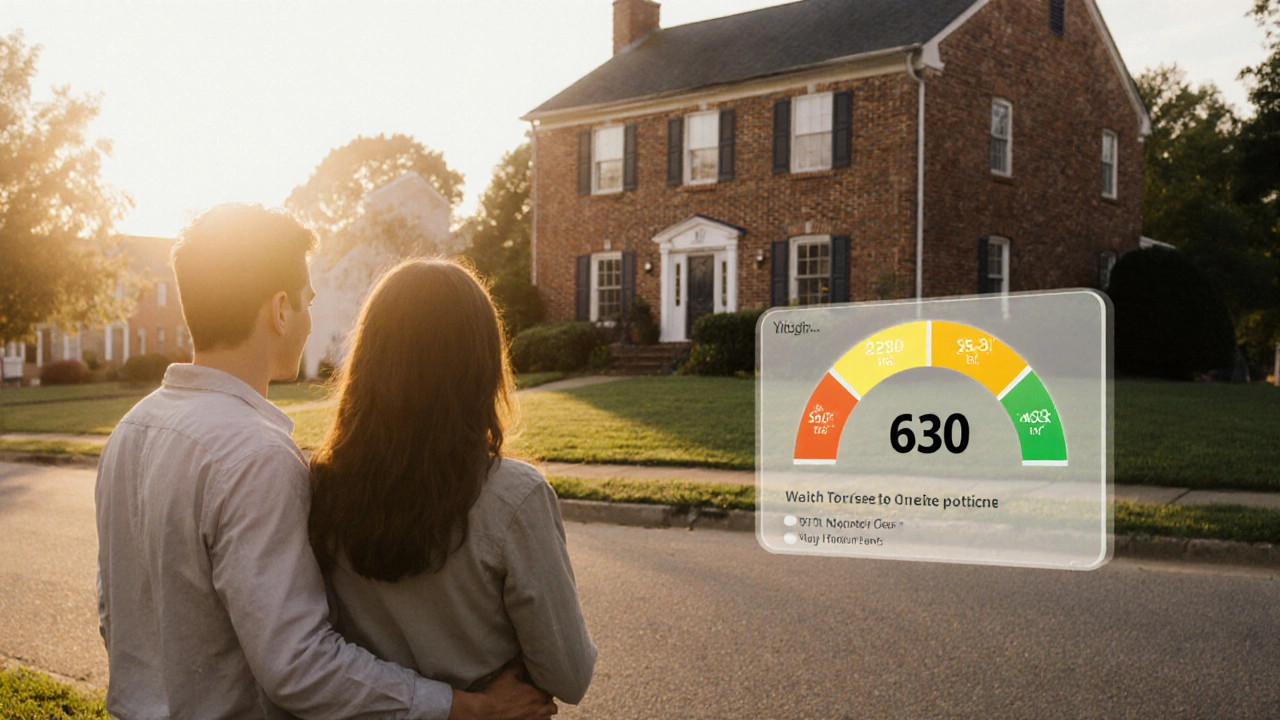Virginia Home Credit Score Calculator
Home Loan Eligibility Calculator
See what Virginia home loan options you qualify for based on your credit score
Enter your credit score and select a loan type to see eligibility results
Key Takeaways
- Most Virginia lenders look for a credit score for a Virginia home of 620 or higher for conventional loans.
- VA loans can be approved with scores as low as 580, and sometimes lower with compensating factors.
- FHA loans generally require a minimum score of 580 for the 3.5% down‑payment option.
- Improving your debt‑to‑income ratio and reducing recent credit inquiries can offset a borderline score.
- If your score falls short, consider a co‑signer, a larger down payment, or a credit‑repair plan before you apply.
What a Credit Score Actually Is
When you start hunting for a home in Virginia, your credit score is a three‑digit number that summarizes how reliably you’ve paid back debt in the past. Lenders pull this number from the three major credit bureaus-Equifax, Experian, and TransUnion-and use it to gauge the risk of lending you money.
How Virginia Lenders Evaluate Your Score
Lenders in the Old Dominion don’t look at the credit score in isolation. They combine it with several other metrics:
- Debt‑to‑income ratio (DTI): the percentage of your monthly income that goes toward debt payments.
- Down payment amount: a larger down payment can lessen the lender’s risk.
- Credit report history: length of credit history, recent inquiries, and any derogatory marks.
Because Virginia has a range of loan programs-from conventional mortgages to government‑backed options-each program sets its own score floor and looks at these extra factors differently.

Score Benchmarks by Loan Type
| Loan Type | Typical Minimum Score | Down Payment Needed | Key Notes |
|---|---|---|---|
| Conventional Loan | 620 (620‑679 = higher rates, 680+ = best rates) | 5‑20% (higher score can lower the percentage) | DTI usually capped at 43%; private‑mortgage‑insurance if <10% down |
| VA Loan | 580 (VA can waive with strong compensating factors) | 0% (no down payment required for eligible veterans) | No PMI; funding fee applies; flexible DTI up to 50% in some cases |
| FHA Loan | 580 (3.5% down) or 500 with 10% down | 3.5% (or 10% if score is 500‑579) | Mortgage‑insurance premium required; DTI up to 50% |
| Virginia Housing Development Authority (VHDA) Loan | 620 (some programs accept 580 with additional cash reserves) | As low as 3% with down‑payment assistance | Targeted at first‑time buyers; income limits apply |
Practical Ways to Boost Your Score Before Applying
- Pay down credit‑card balances to bring utilization below 30% (ideally under 10%).
- Check your credit report for errors and dispute any inaccuracies.
- Avoid opening new credit lines or taking out loans within the 60‑day window before you apply.
- Make all existing payments on time for at least six months; payment history is the biggest scoring factor.
- If you have an older credit‑card you rarely use, keep it open; length of credit history helps the score.
What If Your Score Is Below the Threshold?
Don’t panic. Lenders often consider compensating factors:
- Save a larger down payment - putting 20% down can offset a 600‑score for many conventional lenders.
- Get a co‑signer with a stronger credit profile; the co‑signer’s income and credit are added to the application.
- Choose a government‑backed loan like a VA or FHA program that accepts lower scores.
- Work with a credit‑union or local community bank; they sometimes have more flexible underwriting.
Common Pitfalls to Avoid
- Applying for multiple mortgages in a short period - each hard inquiry can shave 5‑10 points.
- Closing credit cards to “simplify” finances - this can raise utilization and shorten your credit history.
- Ignoring the impact of medical collections - many lenders treat them more leniently, but they still affect the score.
- Assuming a high income hides a low score - lenders will still run the credit check regardless of earnings.
Frequently Asked Questions
What is the minimum credit score to buy a house in Virginia?
For a conventional loan most lenders look for at least 620. VA loans can be approved with scores as low as 580, and FHA loans also start at 580 for the 3.5% down‑payment option.
Does a higher credit score guarantee a lower mortgage rate?
Generally, yes. Lenders assign better interest rates to borrowers with scores above 680, while scores in the 620‑679 range usually see slightly higher rates. The exact rate also depends on DTI, loan type, and market conditions.
Can I get a VA loan with a score below 580?
The VA itself does not set a hard floor, but most lenders set 580 as a practical minimum. If you have strong compensating factors-large cash reserves, low DTI, or a steady employment history-some lenders may still approve you.
How long does it take for my credit score to improve after paying down debt?
Most credit bureaus update balances monthly, so you could see a bump of 10‑20 points within 30‑45 days if you significantly lower your utilization.
Are there Virginia‑specific programs that help low‑score buyers?
Yes. The Virginia Housing Development Authority (VHDA) offers down‑payment assistance and special loan products that can work with scores as low as 580 when you meet income and purchase‑price limits.
